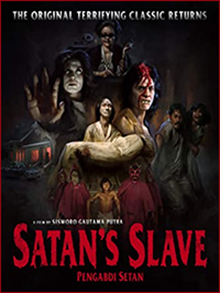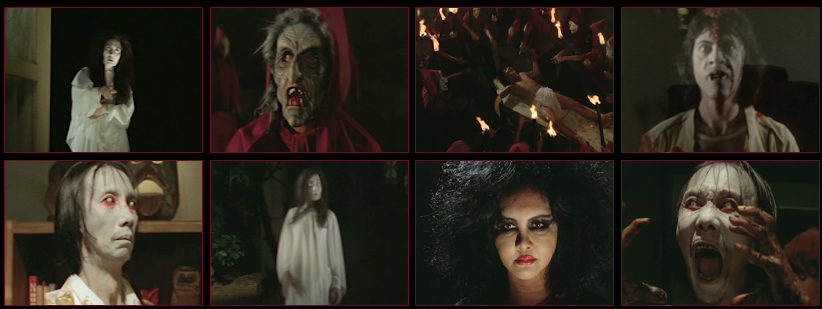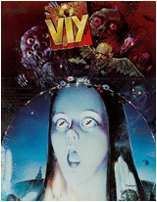
The film starts off at a burial ceremony with an upper-class family who’s lost their mother to a mysterious illness, and sets the eerie tone right off with Islamic chants and the feeling that there’s something wicked in the air. That same night, the family’s son, Tomi, receives an unexpected visit from the dead mother in a ghostly form, who knocks on his window and hypnotizes him to go out in his pajamas, while his sister Rita is witnessing the incident. Tomi goes to a fortune teller (who is wearing some really big sunglasses) who can tell through his tarot cards that Tomi’s life is full of darkness, and that the coffin his mother was buried in is suitable for the whole family, and that they are all in danger – and that he must defend himself with black magic.
In his bedroom, Tomi makes a small altar with a little red box, using horror comics and cheap satanism paperbacks as decorations. No one but Tomi takes this seriously, and his sister thinks he’s losing his mind. Since the father of the family is a stressed and busy entrepreneur with bloodshot eyes, he hires a maid (Darminah), who looks pretty much like the fortune teller we saw minutes earlier, only without the big sunglasses (Uh-oh, nothing shady with her, of course not). At the same time, Tomi has upgraded his altar down in the basement, and this time he’s decorated it with candles and and several Halloween masks by famous Universal monsters. He is also being haunted with night terrors where he is sacrificed by a satanic cult. And that’s not far from a premonition when the sisters receive some creepy phone calls, and the house caretaker, Karto, starts to die slowly of asphyxiation.
I see people comparing Satan’s Slave to Phantasm (1979) and yes, there are some similarities to spot here, without diving to much into comparisons . The eerie and slightly surreal atmosphere is all over the place, and it mixes traditional superstition with some more obscure Asian folklore that we have to thank Wikipedia for being able to understand. I can mention the image we see of their dead mother, which is actually a “Kuntilanak”, a mythological, vengeful female astral spirit who’s associated with – yeah, take a wild guess – black magic. Sadako from Ringu could also be placed into a similar category, just to mention a more known example. And even though writer and director Sisworo Gautama Putra took some obvious influences from Phantasm, the film has its own unique distinctiveness.
And no, just to make it clear, this is not at the same level as the acid trip Mystics in Bali , which came from the same country the year before Satan’s Slave. The plot is pretty straight-forward and far more conventional than expected, really. The downside is that it doesn’t manage to get especially scary, and maybe the laughable goofy acting is to blame for that, especially during the second act. The film looks really great, though, filled with atmosphere, haunting visuals and a fitting synth score. The make-up effects are also great. There’s some obvious fog machines hiding on the set which can make it look somewhat outdated, but will for others just add more to the good ole’ retro charm. So overall, if you don’t take it too seriously, Satan’s Slave is an entertaining flick, with a lot of ghoulish fun that’s perfect to add on a Halloween-playlist.
Thanks to the acclaimed remake that came in 2017, Satan’s Slave was for the first time released on DVD and Blu-ray from Severin Films with polished quality. It’s also available on Shudder.


Director: Sisworo Gautama Putra
Original title: Pengabdi Setan
Country & year: Indonesia, 1982
Actors: Ruth Pelupessi, W.D. Mochtar, Fachrul Rozy, Simon Cader, Siska Widowati, H.I.M. Damsyik, Diana Suarkom, Doddy Sukma, Ali Albar, Adang Mansyur, Moesdewyk, S. Parya, Dewi
IMDb: www.imdb.com/title/tt0281048/
![]()






















